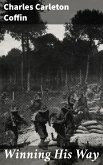George Washington Cable's 'Kincaid's Battery' is a captivating work of historical fiction set during the American Civil War. The novel explores themes of patriotism, honor, and duty through the lens of a diverse group of soldiers in a Union battery. Cable's writing style is characterized by vivid imagery, intricate character development, and a deep understanding of the complexities of war. The author expertly weaves together multiple storylines to create a compelling and thought-provoking narrative that sheds light on the human experience during a tumultuous period in American history. George Washington Cable, a renowned American writer and social reformer, drew inspiration from his own experiences living in the South during the aftermath of the Civil War. His observations of race relations and social injustices informed his writing and added depth to his portrayal of the characters in 'Kincaid's Battery'. Cable's background as a journalist and advocate for social change further enriches the novel with layers of historical and cultural significance. I highly recommend 'Kincaid's Battery' to readers who enjoy historical fiction that delves into the personal and moral dilemmas faced by individuals caught up in the turmoil of war. Cable's masterful storytelling and profound insights make this novel a must-read for anyone interested in exploring the human side of history.
Dieser Download kann aus rechtlichen Gründen nur mit Rechnungsadresse in A, B, BG, CY, CZ, D, DK, EW, E, FIN, F, GR, H, IRL, I, LT, L, LR, M, NL, PL, P, R, S, SLO, SK ausgeliefert werden.









